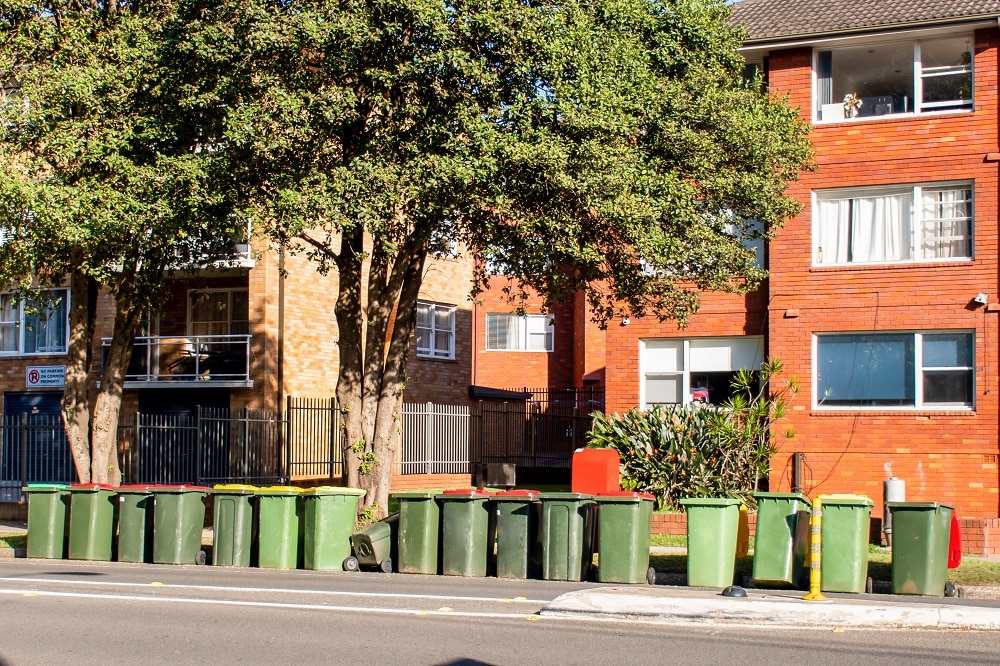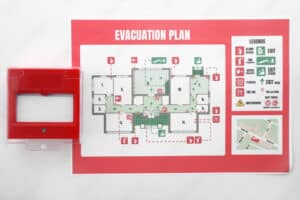
Nobody likes dealing with rubbish, but it’s an essential factor of modern life. Poor waste management practices lead to bad hygiene and unsafe living conditions. Plus, piles of trash left near bins aren’t a good look for prospective owners and residents. Here’s what you need to know about waste management in strata.
Shared bins for household waste
In many strata communities, shared waste bins are supplied for residents to dispose of their rubbish. It might be in the form of larger waste bins on the ground level or even skip bins. This will likely depend on the number of residents in the building.
Generally, it is the responsibility of individual lot owners and tenants to dispose of their own rubbish correctly. This means if your strata building provides separate bins for recycling and general waste, then you need to split it up accordingly before disposal.
Of course, if the communal bins become messy or there are problems with waste separation, the committee may need to step in. If it is clear which residents are causing issues, a notice to comply with by-laws may be issued. If not, the committee will need to manage it independently, either by tidying up for themselves or hiring a professional service to do so.
Residents should be reminded that their actions when using communal bins can directly affect strata fees. If residents don’t do the right thing and external contractors are needed to manage the situation, this is likely to increase running costs and, as a result, also increase strata fees.
Individual bins
While you won’t see it in apartment buildings, many strata communities feature single units. As such, waste collection may operate just like any normal home. Each resident pushes their bins to the curb, and the council collects the waste accordingly.
In these cases, there may be by-laws governing how waste is to be disposed of. Usually, these by-laws will state that rubbish is to be properly wrapped and separated and bins must not be left on the street for any longer than a specified timeframe. Each resident is responsible for their own waste, and notices to comply can be issued if people don’t do the right thing.
Rubbish in communal areas
Common spaces such as foyers, gyms and pools can be difficult to manage from a waste disposal point of view, but they shouldn’t be. Firstly, it’s the committee’s obligation to provide a suitable number of bins in common areas. This helps to reduce waste being left where it shouldn’t be.
Then, somebody needs to ensure those bins are emptied into the larger communal waste bin. This might be a committee member who volunteers for the role or a number of committee members working on a roster. Regardless of how it’s managed, it is a committee’s responsibility.
Bulky items
Large cartons and packaging may fill bins quickly, especially if there are residents moving in/out. The committee may want to consider allocating a dedicated collection point for these to avoid bins being filled prematurely. Residents may also have large items to dispose of, such as old electronics or furniture. Many local councils have bulky good collections, and this can be arranged through your strata manager.
Appropriate signage
Residents need to know how to dispose of their garbage in the appropriate way, so make sure guidelines are available through adequate notices and signs. Several local councils, such as the City of Sydney, have free resources available, like free stickers and posters outlining what can be recycled.
For multi-storey strata communities, you may have garbage chutes on each floor. It is important to make clear to residents what can and can’t be thrown into the chute as damages can be extremely costly to fix.
Need help with strata management?
It’s amazing how much of an issue waste management can become in a strata environment. If you’re having difficulty managing the waste disposal process in your strata building, we’d love to help. More Than Strata provides a complete strata management service, including guidance for strata committees and even taking over the daily management of your facilities. Work with us to help create a better living environment for everyone. Contact the team at More Than Strata today.





